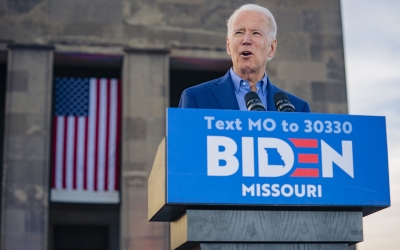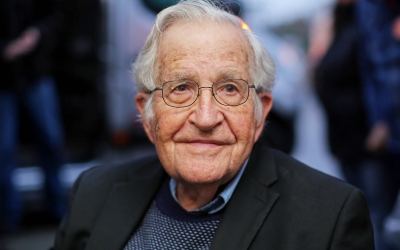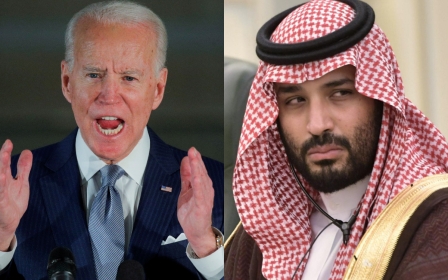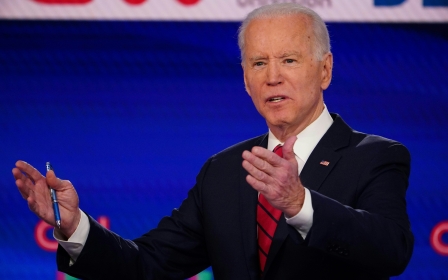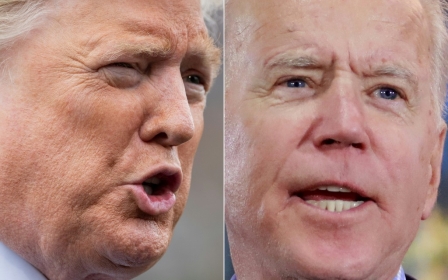Biden's plan for Muslim Americans: A 'good start' but missing policy details
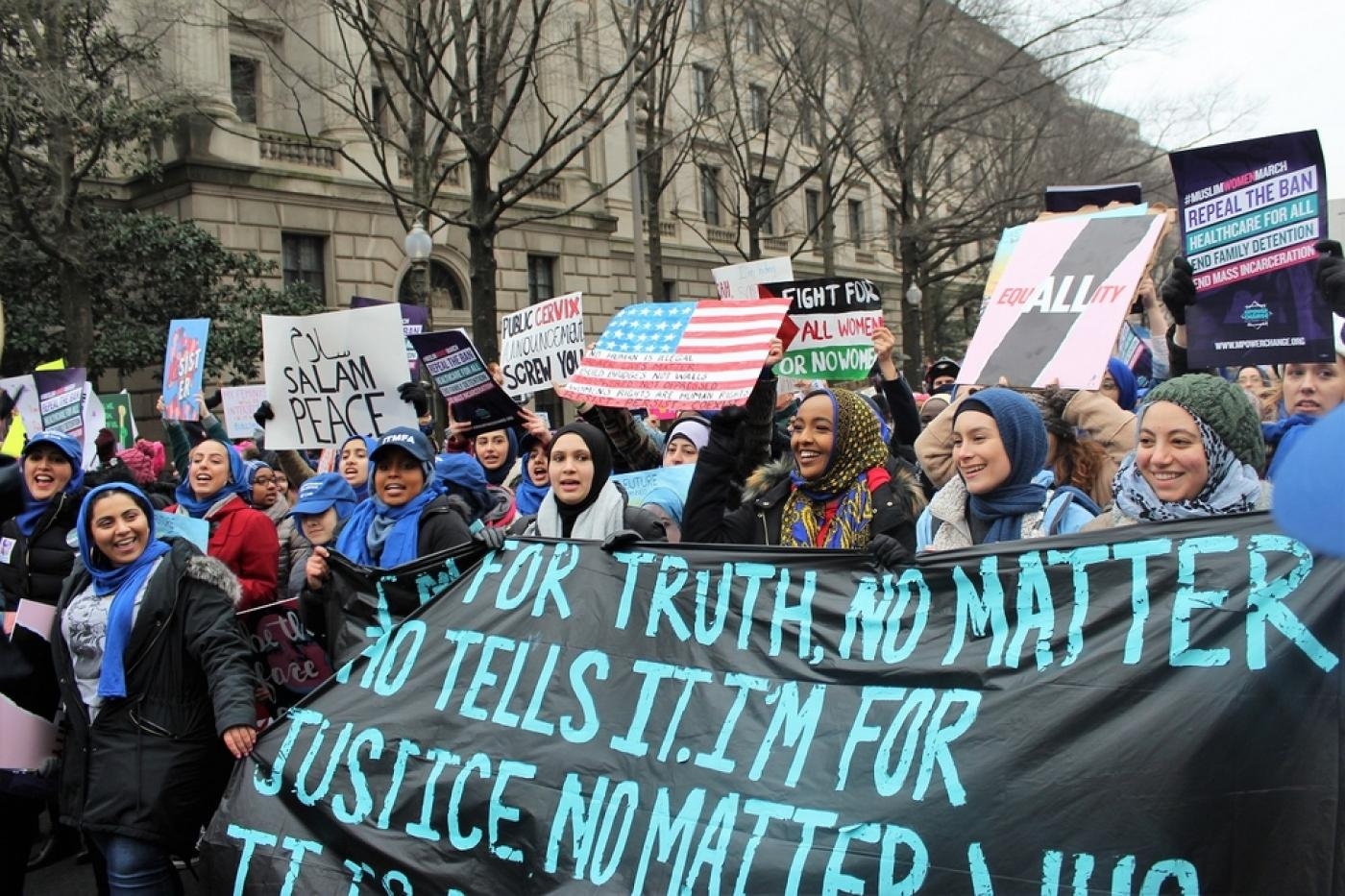
Joe Biden has released a plan to protect the civil rights of Muslim Americans and reverse some of Donald Trump's Islamophobic decrees if elected president.
The plan, titled "Joe Biden's agenda for Muslim-American communities", vows to undo Trump's Muslim ban on "day one" and confront "discriminatory policies" that affect the growing community.
While it lacks specifics and falls short on foreign policy, advocates say the former vice president's pitch is a "good start" and a positive change from the White House's bigoted rhetoric.
Abed Ayoub, legal director of the American-Arab Anti-Discrimination Committee (ADC), welcomed the statement, but criticised it as "too vague".
'What really matters are the details and the nuances'
- Abed Ayoub, ADC
"What really matters are the details and the nuances," Ayoub told MEE. "He needs to have conversations with community members about how to implement some of these talking points and what they would look like."
New MEE newsletter: Jerusalem Dispatch
Sign up to get the latest insights and analysis on Israel-Palestine, alongside Turkey Unpacked and other MEE newsletters
Since the 9/11 attacks, Muslim-American civil rights advocates have decried the federal government's suspicious approach to their communities, which often centres around national security.
Covert surveillance programmes and the use of informants at mosques have sown seeds of mistrust between Muslim Americans and their government.
Civil rights advocates have also rejected the Countering Violent Extremism (CVE) programme, whose stated aim is to push back against radicalisation, but in reality targets Muslims. The initiative, which thrived under the Obama-Biden administration, has been described as "state-sanctioned Islamophobia".
In his plan, Biden seemed to acknowledge the problematic issues in the relationship between government and Muslim Americans.
"Joe's administration will confront discriminatory policies that single out Muslim Americans and cast entire communities under suspicion, and he will ensure that our government’s engagement with Muslims is not viewed through a security lens," the document reads.
Demand for specifics
Ayoub said the former vice president deserves credit for this statement, but his campaign needs to engage directly with the Muslim community to turn the rhetoric into new policies.
"That's a very concrete beginning. Now, what does that mean exactly? How are you going to implement that? That's what many of us want to hear and discuss," Ayoub told MEE.
Wardah Khalid, an activist and policy analyst, echoed Ayoub's remarks.
"I thought it was a good start because it tackled some of the issues that our community has been raising for quite some time, especially around the 2016 election," Khalid said, noting specifically the "securitising" of the Muslim community.
She also lauded the former vice president for committing to reversing the Muslim ban and addressing hate crimes.
"I appreciated that he brought those issues up, but of course there can definitely be more policies mentioned," Khalid said. "He didn't really go into super specifics, and I think there's a lot of room for work here."
She cited policy issues including surveillance, Muslims being placed unfairly on the no-fly list, and anti-sharia legislation being passed by various states that critics say are needless and discriminatory.
Still, rhetoric is not insignificant, Khalid said, noting the surge in hate crimes since Trump burst into national prominence in 2015, vowing to ban all Muslims from entering the country.
"Obviously you want to make sure that this is backed by policies, but I think it matters a lot because we saw what happened with Trump when he was on the campaign trail and after he took office," she said.
Foreign policy
Biden's plan includes a section on foreign policy where he vows to speak out against China's abuses against Uighur Muslims and Myanmar's atrocities against the Rohingya.
The statement also calls out India for recent anti-Muslim schemes, urging the restoration of full civil rights and internet services for the people of Kashmir.
On the Middle East, Biden said he will return to "principled American diplomacy" to help people of all faiths "find dignity, prosperity, and peace".
"That includes ending Donald Trump's 'blank check' for Saudi Arabia’s human rights abuses at home and abroad and ending the war in Yemen," the statement says.
It goes on to reiterate a familiar line on Palestine, promoting the two-state solution without criticising Israel or mentioning the word occupation.
"As president, Joe will actively engage Israelis and Palestinians alike to help them find ways to live together in peace, freedom, security and prosperity and to champion a two-state solution," the plan says.
'Biden has a long career in which he has very consistently refused to take any action that holds Israel accountable'
- Beth Miller, JVP Action
"He will continue to oppose Israeli settlement expansion and has spoken out against annexation in the West Bank. He will reopen the US Consulate in East Jerusalem, and restore economic and humanitarian assistance to the Palestinians."
Ayoub questioned why the section on Palestine was included in the message to Muslim Americans, when it's "the number one Arab issue".
"Palestinians, both Muslim and Christian alike, should be speaking on behalf of Palestine," he said.
He warned the Biden campaign against conflating Arabs and Muslims, saying that the two sets of communities overlap, but they have their unique challenges.
Some research indicates that most Arab Americans are Christians. Ayoub urged Biden to reach out to Arab communities as well.
'Empty rhetoric'
Beth Miller, government affairs manager at JVP Action, a political advocacy group affiliated with Jewish Voice for Peace, slammed Biden's statement on the conflict as "empty rhetoric".
"Biden has a long career in which he has very consistently refused to take any action that holds Israel accountable for human rights violations and oppression of Palestinians," Miller told MEE.
The former vice president, who describes himself as a Zionist and a "stalwart supporter of Israel", categorically rejected the proposal of conditioning aid to Israel after his primary opponent Bernie Sanders floated the idea.
"The idea that I'd withdraw military aid, as others have suggested, from Israel, is bizarre," he said late last year. "I would not do that. It's like saying to France, 'Because you don’t agree with us, we’re going to kick you out of Nato'."
Miller said ensuring accountability for abuses against Palestinians means using the $3.8bn in annual military aid to Israel as leverage to pressure it to end the occupation and abandon its annexation plans.
Earlier this week, JVP Action joined more than 50 organisations calling on Biden to do just that in a letter pressing the former vice president to adopt anti-war policies.
"For decades, Israel has been carrying out a de facto annexation of the West Bank. This is not new, and Biden has consistently refused to take action on it," Miller said.
"We are long past the point of words. We need action... The Israeli government is not going to respond to strong language or concern or this empty rhetoric."
She added that it was "absurd" that Biden's statement makes no mention of Gaza, saying that the spread of the coronavirus could spell a "death sentence" to many Palestinians besieged in "the world's largest open air prison".
"Joe Biden, if he were to become president, would have to recognise that," Miller said. "But again, what we're seeing is that he is unwilling to deal with the tough issues and take the concrete action that needs to be taken to force Israel to treat the Palestinians with the human rights and dignity that they deserve."
For her part, Khalid said the most disappointing aspect of the section was what it does not mention - that Biden plans to keep the US embassy in Jerusalem.
Still, both she and Ayoub acknowledged that Arab, Muslim and Palestine solidarity organisers would have a better chance getting through to Biden than to Trump.
Khalid called for keeping the political engagement going by focusing on local, state and congressional races.
"It's not just about Biden; it's not about the president. It is about who is working in our policymaking process, and that is way more people than just one person."
Middle East Eye delivers independent and unrivalled coverage and analysis of the Middle East, North Africa and beyond. To learn more about republishing this content and the associated fees, please fill out this form. More about MEE can be found here.


